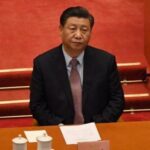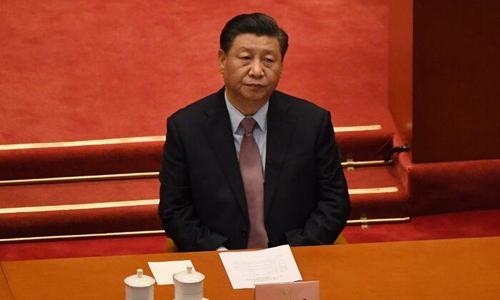China’s global Internet control program


Chinese leader Xi Jinping personally directed the Communist regime to focus its efforts to control the global Internet, replacing the influential role of the United States, according to domestic government documents recently obtained by The Epoch Times.
In a speech in January 2017, Xi said that the "power to control the Internet" had become the "new focal point of [China's] national strategic competition" and singled out the United States as a "rival force" that stood in the way of ambitions of the regime.
The ultimate goal for the CCP is to control content on the Internet so that it can monopolize the world discussion. It is about the "power of discourse" over communications and discussions on the world stage.
Xi articulated a vision of “using technology to govern the Internet” to gain total control over every part of the online ecosystem: applications, content, quality, capital and manpower.
His remarks were made at the fourth executive meeting of the regime's main internet regulator, the Central Commission for Cyberspace Affairs, in Beijing on January 4, 2017, and detailed in internal documents issued by the Liaoning provincial government in the southeast. of China.
The statements confirm Beijing's efforts in recent years to promote its authoritarian version of the Internet as a model for the world.
In another speech given in April 2016, detailed in an internal document from the Anshan City Government in Liaoning Province, Xi confidently proclaimed that in the "struggle" for control of the Internet, the CCP has transformed itself into gambling. " passive defense ”to play both“ attack and defense ”at the same time.
Having successfully built the world's largest and most sophisticated online censorship and surveillance apparatus known as the Great Firewall, the CCP under Xi is turning outward, advocating a Chinese Internet whose values are at odds with the open model. supported by the West. Rather than prioritizing the free flow of information, the CCP system focuses on giving the state the ability to censor, spy on, and control Internet data .
then there is the strategic rivalry with the US. The Chinese leader acknowledged that the regime was lagging behind its rival, the United States, the dominant player in this field, in key areas such as technology, investment and talent.
To realize his ambitions, Xi stressed the need to "manage Internet relations with the United States", while "preparing to fight a tough war" with the country in this area.
American companies should be used by the regime to achieve its goal, Xi said, without elaborating on how this would be done.
He also directed the regime to increase its cooperation with Europe, developing countries and member states of Beijing's "Belt and Road Initiative" to form a "strategic counterweight" against the United States.
The BRI, the infrastructure project to connect China and Europe, funded by Beijing, has also prompted countries to sign projects for the "digital silk road", those involving information and communication technology infrastructures. At least 16 countries have signed MoUs with the regime to work in this sector.
The trident of China's world domination. Xi ordered the regime to focus on three "critical" areas in its quest for control of the global Internet.
- First, Beijing must be able to "set the rules" that govern the international system.
- Second, it should install the CCP's dumbbells in important positions in global Internet organizations.
- Third, the regime should gain control over the infrastructure that underlies the Internet, such as root servers, Xi said.
Domain Name System (DNS) root servers are critical for Internet communications around the world. Direct users to the websites they intend to visit. There are more than 1,300 root servers in the world, about 20 of which are located in China while the United States has about 10 times, according to the root-servers.org website.
If the Chinese regime were to gain control over multiple root servers, it could then redirect traffic wherever it wants. For example, if a user wishes to read an article on a subject deemed sensitive by Beijing, the regime's DNS server could direct the user to a fake page saying the article is no longer online.
In 2019, the Chinese telecommunications giant Huawei first proposed the idea of a completely new Internet, called New IP (Internet Protocol), to replace the half-century-old infrastructure behind the web. The new IP is advertised to be faster, more efficient, flexible and secure than the current Internet and will be built by the Chinese. Too bad this improvement will come at the price of free speech and leaving the CCP the ability to intercept everyone.
The proposal was made at a September 2019 meeting held at the International Telecommunications Union (ITU), a United Nations agency responsible for setting standards for computing and communications issues that is currently led by Chinese citizen Zhao Houlin . The new IP will be formally discussed at the ITU World Telecommunications Standardization Assembly to be held in March 2022.
If it is unlikely that the new infrastructure will be universally adopted, it is likely that Beijing will impose it on its satellites and those that owe it through the BRI program:
This would accelerate a bifurcation of the Internet, what analysts like former Google CEO Eric Schmidt have dubbed " splinternet ": the communist network on one side, the rest of the world on the other.

Thanks to our Telegram channel you can stay updated on the publication of new articles of Economic Scenarios.
The article The Chinese program of world control of the Internet comes from ScenariEconomici.it .
This is a machine translation of a post published on Scenari Economici at the URL https://scenarieconomici.it/il-programma-cinese-di-controllo-mondiale-di-internet/ on Wed, 05 May 2021 08:00:18 +0000.
